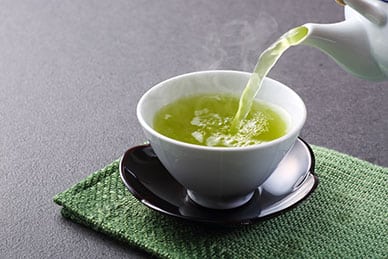Diabetes currently affects about 29 million Americans and nearly 86 million adults, i.e. one in three Americans are prediabetic. Diabetes is on the rise across the world due to rising rates of obesity and sugar consumption, with an estimated 592 million cases in the world by 2035. Preventing diabetes is a top concern for medical professionals and researchers. According to a new study, the benefits of catechins, which are antioxidants found in tea and chocolate, may offer a solution. Researchers found that catechins help prevent diabetes by improving the function of beta cells that produce, store and release insulin to control sugar levels.
Health Benefits of Catechins
Catechins are a special class of flavonoids, or plant-based chemicals with strong antioxidant benefits. Catechins are responsible for giving fruits their flavor and color and they appear to guard against cardiovascular disease, cancer and other chronic diseases.
There is compelling scientific research that catechins help prevent heart disease. According to one study published in the Archives of Internal Medicine, people who regularly drink green or oolong tea have a 46-65 percent lower risk of hypertension than people who do not drink tea. Research suggests that people who drink at least two cups a day of tea have a lower risk of stroke and heart disease as well as lower LDL and total cholesterol. There is also evidence that regular tea drinkers recover faster from heart attacks. The antioxidant effect of catechins helps block oxidation of LDL cholesterol, improve HDL (good) cholesterol, and improve the function of arteries.
Catechins may also help guard against Alzheimer’s disease and promote healthy cell growth. Numerous studies have found a link between green tea consumption and a lower risk of cancer, including breast, ovarian, lung, bladder, esophageal, skin and colon cancer.
Catechins and Diabetes
The hormone insulin, which is made, stored and released by beta cells in the pancreas, is at the root of this chronic condition. Insulin controls and regulates levels of blood sugar to ensure levels do not get high enough to damage organs or low enough to impact bodily functions. Type 2 diabetes reduces sensitivity to insulin, which means the body needs more insulin to achieve the same effect. Research has also shown that diabetes reduces the ability of beta cells to produce and release insulin, possibly due to higher rates of beta cell death.
A study recently published in the Journal of Nutritional Biochemistry investigated whether active chemicals in cocoa could help prevent diabetes.
A team of researchers from Virginia Tech and Brigham Young University has been searching for ways to improve beta cell performance and prevent the onset of diabetes. The team decided to investigate flavonoids in cocoa due to prior research that showed beta cells are very sensitive to oxidative stress.
The team found that rats on a high-fat diet that included cocoa had lower rates of obesity and a greater ability to handle higher levels of glucose. The scientists also found an increase in the expression of genes that promote a response to oxidative stress and mitochondrial function. Mitochondria are the powerhouses of cells like beta cells.
The authors of the study pointed out that consuming high-sugar chocolate will not guard against diabetes and it would be necessary to consume a great deal of cocoa to see any protective benefit. Instead, it’s the active compounds in cocoa that may offer protection against diabetes when consumed in greater concentrations.
How to Increase Your Intake of Catechins
 The most well-known source of catechins is green tea. A half-cup of green tea contains 2.6 milligrams of catechins while a serving of black tea contains 1.5 milligrams. Catechins can also be found in several foods if you don’t enjoy green or black tea.
The most well-known source of catechins is green tea. A half-cup of green tea contains 2.6 milligrams of catechins while a serving of black tea contains 1.5 milligrams. Catechins can also be found in several foods if you don’t enjoy green or black tea.
Some of the best food sources of catechins include:
- Apples, which are rich in plant-based chemicals that include catechins. Most of the catechins in apples are in the skin.
- Blackberries. There are about 37 milligrams of catechins in 3/4 cup of blackberries, which is nearly 14 times the amount in brewed green tea. Catechins in fruit can’t survive being processed, so it’s important to eat the fruit raw. You can also get catechins from cranberries, raspberries and blueberries, but their concentration is not as high as blackberries. In general, the darker the berry, the greater the concentration of catechins.
- Red wine. The catechin concentration of red wine is due to the fermentation process of grapes, which are naturally high in catechins. The darker the grape, the greater the number of catechins. While white wine may have no catechins at all, red wine can have anywhere from seven to 24 milligrams per cup. It’s recommended that adults consume no more than a single five-ounce glass of wine per day to enjoy the health benefits.
- Dark chocolate. Many of the health benefits of dark chocolate, including its ability to lower blood pressure, are attributed to its concentration of catechins. Every ounce of dark chocolate contains about 3.6 milligrams of catechins. Milk chocolate is not a sufficient replacement as it’s more processed with sugar and milk which destroys most of the catechins.
- Pears. Pears are one of the most commonly consumed sources of catechins although they only contain about 0.3 milligrams per 3/4 cup serving.
- Cherries. Cherries have been found to reduce the risk of diabetes, inflammatory disease and cardiovascular disease thanks to their antioxidant benefits. A 3/4 cup serving of cherries contains about 1.3 milligrams of catechins.
- Fava beans. It’s not only fruits that are rich in flavonoids; fava beans contain more catechins than cherries, apples and pears put together. Cooked fava beans have between 8 and 12 milligrams of catechins per 3/4 cup.
- Sweet potatoes. Purple and sweet potatoes contain about two times as many flavonoids like catechins than white potatoes and four times the amount of phenolic acids, another type of antioxidant.
If you find it difficult to eat a diet rich in catechin-containing foods, you can complement your diet with high-quality supplements that contain these powerful compounds.

